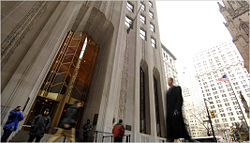Home
From Wikibon
| Line 14: | Line 14: | ||
{| | {| | ||
|+ | |+ | ||
| - | | colspan="2" | <tipoftheday category=" | + | | colspan="2" | <tipoftheday category="wikitips" /> |
|+ | |+ | ||
| width="50%" valign="top" | | | width="50%" valign="top" | | ||
| Line 32: | Line 32: | ||
<p style="color: #666;">Fluctuating energy prices have heightened electricity and energy consumption as a major issue within the technology community. IT is a significant consumer of energy and IT energy costs have been rising disproportionately because of continued investment in denser IT equipment. Estimates from the EPA and others indicate that IT will account for 3% of energy consumption by 2012.</p> | <p style="color: #666;">Fluctuating energy prices have heightened electricity and energy consumption as a major issue within the technology community. IT is a significant consumer of energy and IT energy costs have been rising disproportionately because of continued investment in denser IT equipment. Estimates from the EPA and others indicate that IT will account for 3% of energy consumption by 2012.</p> | ||
[[Planning a green storage initiative | read more...]] | [[Planning a green storage initiative | read more...]] | ||
| - | |}[[Category:Business compliance]]<br />[[Category: Email archiving]]<br />[[Category: Finance]]<br />[[Category: Information Management wikitips]]<br />[[Category: Information management]]<br />[[Category: Leasing]]<br />[[Category: Wikitips]]<br /> | + | |} |
| + | [[Category:Backup and restore]]<br />[[Category: Business compliance]]<br />[[Category: Data Protection wikitip]]<br />[[Category: Data deduplication]]<br />[[Category: Email archiving]]<br />[[Category: Finance]]<br />[[Category: Information Management wikitips]]<br />[[Category: Information management]]<br />[[Category: Leasing]]<br />[[Category: Mobile Enterprise Wikitips]]<br />[[Category: Wikitips]]<br /> | ||
Revision as of 02:31, 7 January 2009
Latest Peer Incites:
1. Six Wikibon experts break down EMC's recent analyst event (23 Mins)
2. Grant, a Sr. Storage Admin at a large bank discusses how heterogeneous storage virtualization can help reduce the budget for 2009. (20 Mins)
WikitipIs Amazon Silk the future of browsers?One of the latest tablets from Amazon, Kindle Fire, introduces a new Web browser called Amazon Silk. A cloud-accelerated mobile browser, I believe that Amazon Silk will prove to be a stepping stone in the development of browsers. To achieve faster speeds, the browser is leveraging the cloud, specifically, the Amazon Web Services and the EC2 cloud. The speed is so much increased, that a task which is usually performed in 100 milliseconds will only take 5. But how does this happen? The secret lies on its split architecture. Because tablets are mobile and not as high performing as desktops or laptops, this is the logical next step: keeping the Web browsing fast and simple, while having all the elements that consume many resources stored in the cloud. So what is split architecture? The tasks included in the process of Web browsing are split between the tablet and the back-end, which is in the cloud. The main systems are on the Kindle Fire, and the additional elements are found remotely on the Amazon Cloud. When clicking a link, the request is being delivered to the cloud, which fetches the elements, optimizes them and loads them to the mobile device. According to Amazon, the cloud functions as a limitless cache where images, CSS, JavaScript are stored for the most common visited pages. This will lead to lighter processing on the tablet. These back-end resources are optimized so that they do not unnecessarily load the mobile device. For example, a picture can have 5 megabytes, but on the tablet it will only load 50 kilobytes, at the same quality. Therefore, you get the maximum of utility and nothing is wasted, and you will have more space on your Kindle. However, this kind of browsing has already sparked a lot of interest and debates. Kindle Fire already had 250,000 preorders in five days. On the downside, I would like to mention this article: http://news.cnet.com/8301-30685_3-20113387-264/amazon-silk-one-step-forward-two-steps-back/ It gives a very interesting point of view regarding the fact that Amazon can predict user behavior patterns. The browser predicts what kind of pages you might want to read, sends requests in advance, and preloads them. The author argues that the company might take advantage of the users’ browsing habits in order to place ads, according to the online searches the user initiates. I believe that Amazon Silk is an amazing product, very fast, which will greatly improve the user experience of Web browsing. It also provides a great model on how to get the maximum from cloud computing resources. I think the future for browsers lies in split architecture. More resources about it can be found here: http://amazonsilk.wordpress.com/ |
Featured Case StudyFinancial giant goes greenThe corporate IT group of a very large, worldwide financial organization with 100,000 employees, has initiated an ongoing “greening” process. This is focused largely on reducing energy use both to decrease the corporation's carbon footprint while creating a net savings in operational costs over the lifetime of new, more energy-efficient equipment, including new storage systems. |
|
Featured How-To Note |
Planning a Green Storage InitiativeFluctuating energy prices have heightened electricity and energy consumption as a major issue within the technology community. IT is a significant consumer of energy and IT energy costs have been rising disproportionately because of continued investment in denser IT equipment. Estimates from the EPA and others indicate that IT will account for 3% of energy consumption by 2012. | |||



